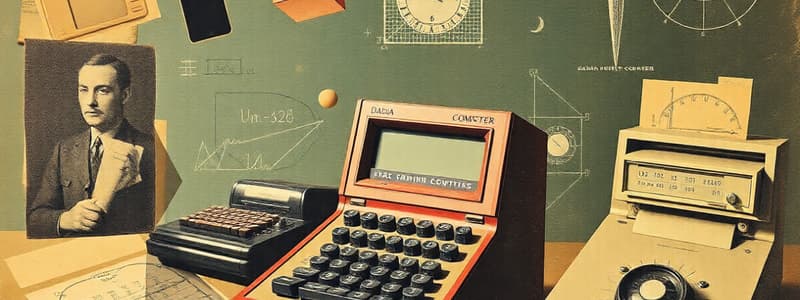Podcast
Questions and Answers
Who invented the first reliable, useful, and commercially successful calculating machine?
Who invented the first reliable, useful, and commercially successful calculating machine?
- Charles Babbage
- Herman Hollerith
- Thomas de Colmar (correct)
- Howard H. Aiken
What was the primary purpose of the Difference Engine designed by Charles Babbage?
What was the primary purpose of the Difference Engine designed by Charles Babbage?
- To automate card punching
- To print financial reports
- To tabulate polynomial functions (correct)
- To perform complex arithmetic operations
Which invention is recognized as the first programmable computer?
Which invention is recognized as the first programmable computer?
- Atanasoff-Berry Computer
- Harvard Mark 1
- Z1 (correct)
- Analytical Engine
What was significant about the ENIAC computer?
What was significant about the ENIAC computer?
Which of the following machines was invented to assist in summarizing information and accounting?
Which of the following machines was invented to assist in summarizing information and accounting?
Who is credited with writing the first programs for the Analytical Engine?
Who is credited with writing the first programs for the Analytical Engine?
What was the first electronic digital computing device invented?
What was the first electronic digital computing device invented?
Which of the following describes the UNIVAC 1?
Which of the following describes the UNIVAC 1?
What was the earliest job title for those performing calculations before the advent of computers?
What was the earliest job title for those performing calculations before the advent of computers?
Which ancient device was used as a memory aid to record numbers and messages?
Which ancient device was used as a memory aid to record numbers and messages?
Which computing device was invented by Blaise Pascal?
Which computing device was invented by Blaise Pascal?
What significant limitation did the Pascaline have?
What significant limitation did the Pascaline have?
Which mechanical device was invented by John Napier in 1614?
Which mechanical device was invented by John Napier in 1614?
What is a primary use of the Slide Rule?
What is a primary use of the Slide Rule?
In what year was the Jacquard Loom invented?
In what year was the Jacquard Loom invented?
What kind of calculations could the Stepped Reckoner perform?
What kind of calculations could the Stepped Reckoner perform?
Flashcards are hidden until you start studying
Study Notes
History of Computing
- The term "computer" was first used in 1613 to describe a person who performed calculations.
- The earliest computers were humans, whose job was to perform calculations.
- Calculations were specialized and expensive, requiring years of training.
Early Calculating Devices
- Tally Sticks: An ancient device for recording numbers and quantities.
- Abacus: A mechanical device for performing basic arithmetic, invented in Babylonia around 2400 B.C.
- Napier's Bones: Invented in 1614, used for multiplication, division, and calculating square and cube roots.
- Slide Rule: Invented in 1622, based on logarithms and used for multiplication, division, roots, logarithms, and trigonometry.
- Pascaline: Invented in 1642, limited to addition and subtraction and was expensive.
- Stepped Reckoner: Invented in 1672, capable of adding, subtracting, multiplying, and dividing automatically.
- Jacquard Loom: Invented in 1881, an automatic loom controlled by punched cards.
- Arithmometer: Invented in 1820, the first reliable, commercially successful mechanical calculator, capable of performing the four basic arithmetic functions.
- Difference Engine and Analytical Engine: Invented by Charles Babbage in 1822 and 1834 respectively. The Difference Engine was designed to tabulate polynomial functions while the Analytical Engine is considered the first mechanical computer.
- Scheutzian Calculation Engine: Invented in 1843, based on Babbage's Difference Engine and the first printing calculator.
Early Computers
- First Computer Programmer: Augusta Ada Byron, who suggested using the binary system and wrote programs for the Analytical Engine.
- Tabulating Machine: Invented in 1890 for summarizing information and accounting.
- Harvard Mark 1: Invented in 1943, the first electro-mechanical computer.
- Z1: Created by Konrad Zuse from 1936 to 1938, the first programmable computer, using punch tape for input and output.
- Atanasoff-Berry Computer (ABC): Invented between 1939 and 1942, the first electronic digital computing device.
- ENIAC (Electronic Numerical Integrator and Computer): Completed in 1946, the first electronic general-purpose computer, developed by John Presper Eckert and John Mauchly.
- UNIVAC 1: The first commercial computer, designed by John Presper Eckert and John Mauchly.
Studying That Suits You
Use AI to generate personalized quizzes and flashcards to suit your learning preferences.




